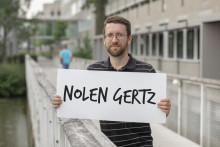A student shouldn’t be seen as an empty vessel that is to be filled by the teacher, stresses Nolen Gertz. You can only educate if you have a horizontal relationship of equals, if you learn from each other. When communicating with your students, you need to start a dialogue. Talk with them, not at them.
As he puts it, Gertz teaches using the Socratic method. He engages students and he never acts like he knows everything. On the contrary. He starts every lesson with stating that he also doesn’t get the topic he will talk about. He tells the students that he hopes they will leave the classroom feeling as confused as he is. He is simply there to share his wisdom, which is that ‘he knows that he knows nothing’. He believes this method isn’t and shouldn’t be specific to teaching philosophy. He teaches how to think and it doesn’t matter what you think about.
Another skill the Assistant Professor focuses on in all his courses is learning how to read. Reading line by line. Word by word. Because we are taught how to scan, not how to read. His students need to get used to the idea that they don’t yet know how to read and they can expect a lot of reading during his classes, most of which make use of PowerPoint presentations. He used to look down on this common tool, but later began appreciating the diversity of student learning and that many students are also visual learners.
Gertz admits he can have strict expectations and grade in accordance with these high expectations. You can’t maintain the seriousness of what you are talking about and give everyone an A. If the grade becomes meaningless, the class itself is meaningless. On the other hand, grading is the teacher’s least favourite part of the job. Together with fighting for students’ attention – a screen against a screen. It’s hard to tell students to stop looking at their mobile or laptop screens in order to stare at his giant screen. It sends a mixed message. And that is a challenge, especially for a teacher of philosophy of technology.
Apart from these aspects, Nolen Gertz loves teaching. It makes him feel more alive. He thinks it’s the only thing he has ever done that he is good at. When lecturing, he never just goes through the motions. He enjoys it: standing in front of the classroom, asking questions, drawing complicated concept maps. His students often need to tell him to take a break, he could just go on talking for hours. He looks forward to every lesson. In ten years of teaching, he has never called in sick. He has never missed a class.







